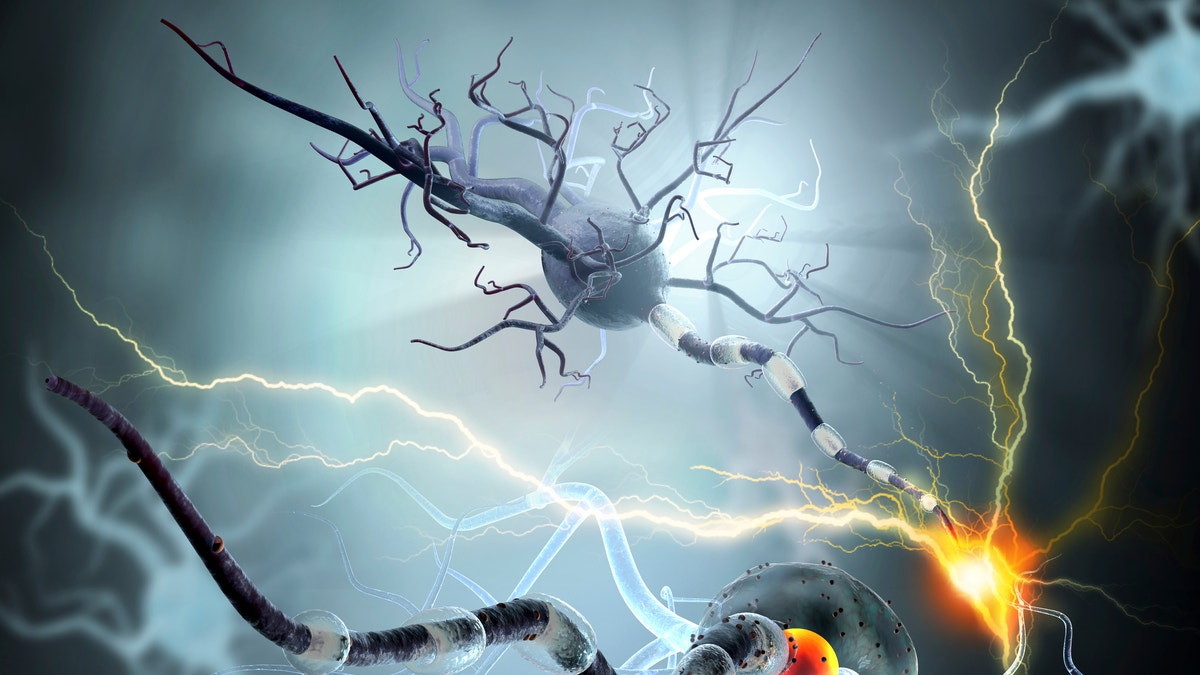
High quality 3d render of nerve cells, concept for Neurologic Diseases, tumors and brain surgery. (Ralwel)
On any given day, your brain processes about 70,000 thoughts. For that to occur, 100 billion neurons need to connect at more than 500 trillion points—a process that generates enough electricity to power a light bulb. A seizure is what happens when there's an electrical glitch in that system.
Here's what you should know about these episodes of abnormal brain activity, starting with the fact that anyone can have them. (Make 2017 YOUR year by taking charge of your health and jump-starting your weight loss with the super-handy Prevention calendar and health planner!)
You don't have to have epilepsy to have a seizure.
Epilepsy is a brain disorder that causes recurring seizures, but this diagnosis isn't necessary for your brain to temporarily go "offline."
"Under the right circumstances, anyone can have a seizure," explains Santosh Kesari, MD, PhD, a neurologist, neuro-oncologist and chair of the department of translational neuro-oncology and neurotherapeutics at the John Wayne Cancer Institute in Santa Monica, CA. Seizures sometimes happen to people who are majorly sleep deprived, use drugs, or suffer a brain injury. Low blood sugar, an anxiety attack, and a fainting spell can also put you at risk. (If you’re feeling anxious, these 6 surprising things could be to blame.)
Young children between the ages of 6 months and 5 years are at risk of febrile seizures, which are brought on by high fevers. And in older people, Kesari says, a seizure can indicate a stroke, tumor, or multiple sclerosis.
Seniors are the fastest growing segment of epilepsy patients.
And they're difficult to diagnose, because signs like confusion, temporary loss of awareness, and hearing or seeing things that aren't there can mimic dementia—which also becomes more common after 65. (Boost your memory 23 percent with this one simple trick.)
Seizures don't all look or feel the same.
Think of a seizure and you probably imagine someone shaking all over, then passing out. This is called a grand mal seizure, but you can also have partial seizures that are limited to one part of the brain and don't spread to the rest of your body, says Kesari.
The symptoms of these can include weird smells, clicking or ringing when there’s no sound, a "déjà vu" sensation (check out these 6 times your body acts nutty—like déjà vu—and what it really means) , or tingling or numbness in a particular part of the body such as the hands. And since the person is usually fully awake and alert during the episode, which typically lasts less than 2 minutes, you might not even know that you've had a seizure. (Get ready to be inspired; this woman's seizure disorder didn't stop her from losing 150 pounds.)
Seizures can affect your pregnancy.
Women with a seizure disorder have a greater chance of having a baby with a birth defect. Having a seizure while you're pregnant has the potential to harm your baby, but so might taking certain antiepileptic drugs that help reduce your chances of having seizures. To keep both you and your baby safe, your doctor should closely monitor you throughout your pregnancy.
Some people can predict a seizure days before it happens.
In the days or hours leading up to a seizure, some people with epilepsy have what's called a prodrome. "This may be a sense that they're about to succumb to a seizure, or a change in behavior that may be typical of the time prior to a seizure," explains Christi N. Heck, MD, medical director of the USC Comprehensive Epilepsy Program at Keck School of Medicine and chair of the professional advisory board of Epilepsy Foundation.
Common symptoms include irritability, depression, headache, or poor concentration, although what causes the prodrome isn't clear. It could be anything from hormonal changes to a migraine. "What physiologic change causes a seizure is not well understood," Heck says.
You might be able to stop a seizure from happening.
Some people with epilepsy have "rescue" medication (a drug that's absorbed quickly by the body) that they can take when they feel a seizure coming on. Others might have a vagus nerve stimulator implanted: This gadget emits electrical impulses to the brain at the onset of a seizure, much like a pacemaker regulates an irregular heart rhythm.
That said, if you've only had one seizure in your life, you don't necessarily need to worry about it happening again. For instance, if you're a young person who stayed up all night partying and have never had a seizure before this incident, "we might say, 'Just don't do that again,'" says Kesari. "Treatment needs to be individualized."
Everyone should know how to respond.
If you have a seizure disorder, make sure the people you're around most often—such as family, coworkers, and neighbors—know what to do if you have an episode. "Just providing that information may help prepare all involved," Heck says.
And if you happen to be present when someone else has a seizure? Call 911, then help the person sit or lie down in a safe place. If he's unconscious, tilt his head to the side so he can breathe more easily. (No, you shouldn't put a sock in his mouth or worry about him swallowing his tongue, which is impossible.) Meanwhile, stay calm. The brain will reboot soon.







































